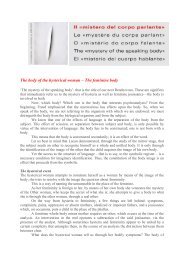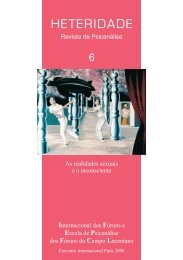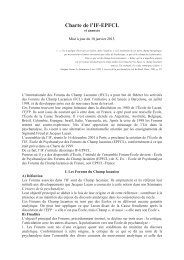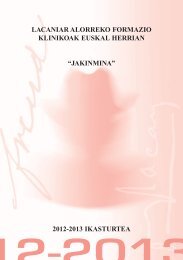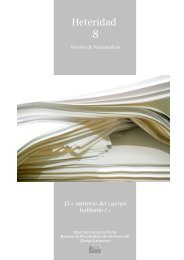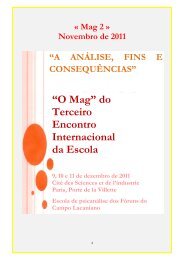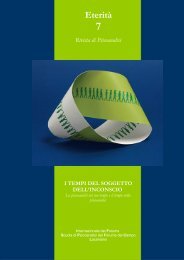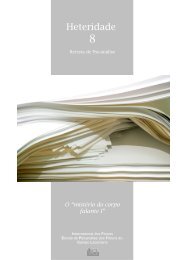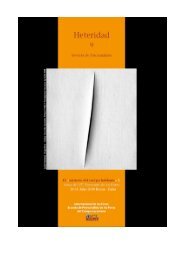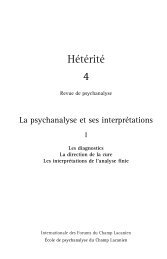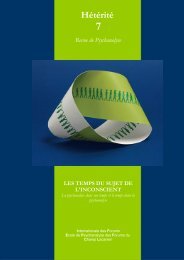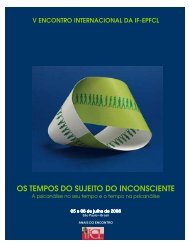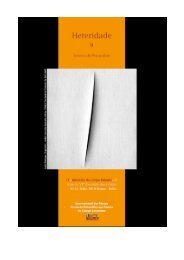O TEMPO NA DIREÃÃO DO TRATAMENTO
O TEMPO NA DIREÃÃO DO TRATAMENTO
O TEMPO NA DIREÃÃO DO TRATAMENTO
Create successful ePaper yourself
Turn your PDF publications into a flip-book with our unique Google optimized e-Paper software.
Immortality<br />
Leonardo S. Rodríguez<br />
n his tale ‘The Immortal’,<br />
I<br />
Jorge Luis Borges tells the<br />
adventures of an explorer<br />
who after much trouble<br />
manages to reach the city of<br />
the Immortals. The place is<br />
deserted and its disposition<br />
and buildings most strange.<br />
They do not appear to serve any<br />
purpose: windows that are too high;<br />
doors that open to empty spaces or holes<br />
in the ground; corridors and staircases<br />
that lead nowhere; staircases constructed<br />
upside down; staircases with steps so<br />
irregular that it is very hard to walk on<br />
them; constructions with unintelligible<br />
shapes. The race of immortals that built<br />
the city now lives elsewhere, in caves or<br />
in the open. They are troglodytes: they<br />
do no practice, as Borges puts it, ‘the<br />
commerce of the word’. They live in a<br />
state of lethargic apathy, totally<br />
indifferent to the world. The visitor<br />
notices a troglodyte lying on the ground<br />
with a bird’s nest on his chest built in<br />
immemorial times. Their bodies are<br />
lifeless; their immortality has guaranteed<br />
them complete, infinite satisfaction and<br />
all possible human experiences – and as a<br />
result, their desire has died. Borges<br />
writes:<br />
[…] The republic of immortal<br />
men had achieved the perfection<br />
of tolerance and almost of<br />
disdain. They knew that when<br />
time is infinite everything<br />
happens to every man. For his<br />
past or future virtues, every man<br />
has the right to every form of<br />
kindness, but he is also open to<br />
every form of treason, for his<br />
crimes of the past and future. […]<br />
In such a world, all our acts are<br />
just, but also indifferent. There is<br />
no moral or intellectual merit.<br />
Homer created The Odyssey; if<br />
time is infinite, if circumstances<br />
and changes are infinite, then the<br />
impossible thing is not to write<br />
The Odyssey at least once. Nobody<br />
is somebody; a single immortal<br />
man is every man. Like Cornelius<br />
Agrippa, I am god, I am hero, I<br />
am a philosopher, I am a demon<br />
and I am the world, which is a<br />
rather tedious way of saying that I<br />
am not. (Borges, p. 541)<br />
Immortality, the abolition of death,<br />
entails the death of desire; but also,<br />
according to the poet, a form of radical<br />
insanity whose salient feature is a state of<br />
catatonic autism. Borges’ explorer looks<br />
at a palace in the city of the Immortals<br />
and thinks: This palace has been built by the<br />
gods. Then be reflects further and<br />
corrects himself: The gods that erected this<br />
palace have died. And finally he concludes:<br />
The gods that constructed this palace were mad.<br />
With the death of desire comes the death<br />
of creativity. Borges writes:<br />
The foundation of their city was<br />
the last symbol to which the<br />
Immortals consented; it signalled<br />
a stage when, concluding that all<br />
enterprise is futile, they decided to<br />
live only in thought, in pure<br />
speculation. They erected the city,<br />
forgot about it and went to live in<br />
caves. Permanently in a trance-like<br />
state, they barely perceived the<br />
physical world. (Borges, p. 540)<br />
Death, which our subjection to<br />
language makes it a necessary presence in<br />
our being, is the ultimate motor of<br />
desire. Our finite condition makes us<br />
human, subjects of a restricted<br />
temporality, of a circumscribed, singular<br />
and necessarily mutilated history, always<br />
running out of time, permanently losing<br />
opportunities. Freud thought that we fear<br />
castration rather than death, and this is<br />
so precisely because our mortal<br />
condition makes our lacks and losses<br />
truly irreversible within our limited<br />
allocated time.<br />
Freud did not see in our mortal<br />
condition a handicap but rather a fertile<br />
Heteridade 7<br />
Internacional dos Fóruns-Escola de Psicanálise dos Fóruns do Campo Lacaniano 84



